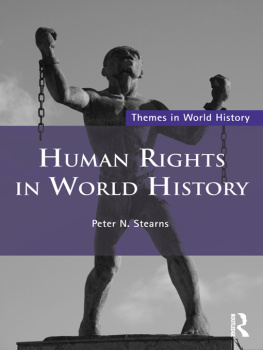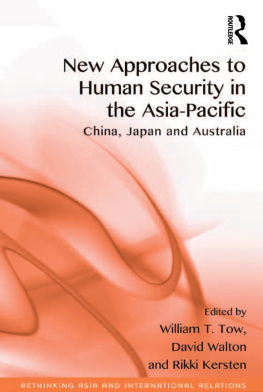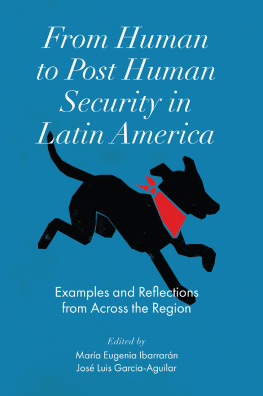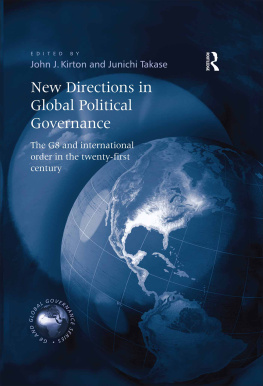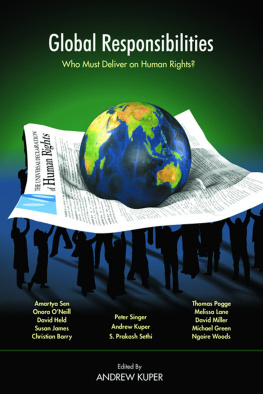Evans - The Politics of Human Rights: A Global Perspective (Human Security in the Global Economy)
Here you can read online Evans - The Politics of Human Rights: A Global Perspective (Human Security in the Global Economy) full text of the book (entire story) in english for free. Download pdf and epub, get meaning, cover and reviews about this ebook. year: 2005, publisher: Pluto Press, genre: Politics. Description of the work, (preface) as well as reviews are available. Best literature library LitArk.com created for fans of good reading and offers a wide selection of genres:
Romance novel
Science fiction
Adventure
Detective
Science
History
Home and family
Prose
Art
Politics
Computer
Non-fiction
Religion
Business
Children
Humor
Choose a favorite category and find really read worthwhile books. Enjoy immersion in the world of imagination, feel the emotions of the characters or learn something new for yourself, make an fascinating discovery.

The Politics of Human Rights: A Global Perspective (Human Security in the Global Economy): summary, description and annotation
We offer to read an annotation, description, summary or preface (depends on what the author of the book "The Politics of Human Rights: A Global Perspective (Human Security in the Global Economy)" wrote himself). If you haven't found the necessary information about the book — write in the comments, we will try to find it.
Evans: author's other books
Who wrote The Politics of Human Rights: A Global Perspective (Human Security in the Global Economy)? Find out the surname, the name of the author of the book and a list of all author's works by series.
The Politics of Human Rights: A Global Perspective (Human Security in the Global Economy) — read online for free the complete book (whole text) full work
Below is the text of the book, divided by pages. System saving the place of the last page read, allows you to conveniently read the book "The Politics of Human Rights: A Global Perspective (Human Security in the Global Economy)" online for free, without having to search again every time where you left off. Put a bookmark, and you can go to the page where you finished reading at any time.
Font size:
Interval:
Bookmark:
The Politics of Human Rights
Human Security in the Global Economy
Series editor: Professor Caroline Thomas (University of Southampton)
Also available
African Democracies and African Politics
M.A. Mohamed Salih
Global Governance, Development and Human Security
The Challenge of Poverty and Inequality
Caroline Thomas
The Political Economy of Global Communication
An Introduction
Peter Wilkin
The Politics
of Human Rights
A Global Perspective
Second Edition
Tony Evans

First published 2001, second edition published 2005
by Pluto Press
345 Archway Road, London N6 5AA
www.plutobooks.com
Copyright Tony Evans, 2001, 2005
The right of Tony Evans to be identified as the author of this work has been asserted by him in accordance with the Copyright, Designs and Patents Act 1988.
British Library Cataloguing in Publication Data
A catalogue record for this book is available from the British Library
ISBN 978 0 7453 2374 9 Hardback
ISBN 978 0 7453 2373 2 Paperback
ISBN 978 1 8496 4279 8 PDF eBook
ISBN 978 1 7837 1488 9 Kindle eBook
ISBN 978 1 7837 1487 2 EPUB eBook
Library of Congress Cataloging in Publication Data applied for
10 9 8 7 6 5 4 3 2 1
Designed and produced for Pluto Press by
Chase Publishing Services Ltd, Fortescue, Sidmouth, EX10 9QG, England
Typeset from disk by Stanford DTP Services, Northampton, England
Printed on demand and bound in the European Union by
CPI Antony Rowe, Chippenham and Eastbourne, England
For Seth
Contents
Series Introduction
HUMAN SECURITY IN A GLOBAL ECONOMY
The idea for this series grew out of a panel on human security at the British International Studies Association conference (BISA) in December 1998. Panellists expressed concern at the silence of the International Relations discipline in the face of growing inequality and widespread poverty that characterized the era of neoliberal development. The uneven distribution of the benefits of the globalization process, and the general failure of that process to attend to the human security of the majority of humanity, were noted. There was a desire to remove the intellectual blinkers arising from an emphasis on a state level analysis and to put people first.
The series is concerned with the area of convergence between International Relations and Development Studies. In contrast to most International Relations series, which take the state as the central unit of analysis, this series gives primacy to human beings and their complex social, political, economic and cultural relations. Importantly, the concept of human security pursued here differs fundamentally from competitive, possessive notions of security of the individual conceived in the currently fashionable neoliberal sense. Rather, human security describes a condition of existence in which basic material needs are met and in which human dignity, including meaningful participation in the life of the community, can be met. Thus while material sufficiency lies at the core of human security, in addition the concept encompasses non-material dimensions to form a qualitative whole. Human security is oriented towards an active and substantive notion of democracy, and is directly engaged with discussions of democracy at all levels, from the local to the global.
The series investigates the causes of human insecurity and the pursuit of human security. For the majority of humankind, human security is pursued as part of a collective, most commonly the household, sometimes the community defined along other lines such as religion, caste, ethnicity or gender or a combination of these. States play a critical role in the achievement of human security; they have the authority and the responsibility to attend to the human security needs of citizens. Statesociety relations come up for scrutiny, as fundamental questions arise concerning state capacity, state legitimacy and state collapse. Global processes may impact on, even jeopardize human security; thus these processes and the global governance structures that drive them need investigation. Regional organizations and global governance institutions set and implement the global development agenda and the global security agenda. Private transnational banks and transnational corporations exert a huge influence. Indeed the development of the global economy requires us to consider humanity embedded not simply within discrete territorial states, but within a global social structure, the capitalist world economy that has been developing since the sixteenth century. The aim is the exposure of policies which undermine the fulfilment of human security and the articulation of processes, policies and practices which support it.
Preface
This volume is not intended for those who want to delve more deeply into the existing rules and practices of the international human rights regime. Nor will it offer a detailed overview of particular human rights violations or particular historic instances where violations of human rights have been widely reported. Instead, the arguments presented here focus on the global politics of human rights. To follow this path is to engage in debates about human rights as power and interests. This does not imply that the power of human rights serves the interests of the dispossessed, the marginalized, the persecuted or the excluded alone. Rather, the discussion here looks at the interests associated with globalization, and the part that the discourse of universal human rights plays in legitimating those interests.
As feedback on the first edition indicates, few readers remain indifferent to the politics of human rights. For those committed to the current universal human rights regime, arguments over politics, power and interests have little part to play in the effort to promote and protect human freedoms. For this group, human rights are neutral claims that seek to protect everyone from a denial of their natural rights. The politics of rights is a distraction perhaps a heresy the pursuit of which can only damage the global project for human rights. For others, however, the politics of rights allows an insight into many aspects of the global discourse of human rights that remain a puzzle. Why, for example, does the human rights regime take the form that it does? Why is such stress given to civil and political rights? What is the relationship between the globalization of the political economy and human rights? Why do we invest so much faith in international law solutions for protecting human rights? Are human rights violations inevitable, given the current world order? For this second group, politics does not present a challenge to promoting human rights but, rather, an opportunity to understand the current status and authority of human rights globally.
Together with some minor revisions to the chapters that appeared in the first edition, this revised second edition includes a new chapter ( ) that discusses the structure of the discourse of human rights, as it is practised today.
Introduction:
Globalization and the Study of Universal Human Rights
The general theme of this series is human security, defined as something more than the conventional concept of military security that has dominated the literature on international relations for so long. Following the United Nations Development Programmes (UNDP) definition, human security refers to safety from the constant threats of hunger, disease, crime and repression and protection from sudden and hurtful disruptions to the patterns of our daily lives whether in the home, in our jobs, in our communities or in our environment. Human security is not therefore only to do with cataclysmic political and international events, but with job security, income security, health security, environmental security [and] security from crime (UNDP 1994). The UNDP confirmed this approach to human security in its tenth annual
Next pageFont size:
Interval:
Bookmark:
Similar books «The Politics of Human Rights: A Global Perspective (Human Security in the Global Economy)»
Look at similar books to The Politics of Human Rights: A Global Perspective (Human Security in the Global Economy). We have selected literature similar in name and meaning in the hope of providing readers with more options to find new, interesting, not yet read works.
Discussion, reviews of the book The Politics of Human Rights: A Global Perspective (Human Security in the Global Economy) and just readers' own opinions. Leave your comments, write what you think about the work, its meaning or the main characters. Specify what exactly you liked and what you didn't like, and why you think so.







